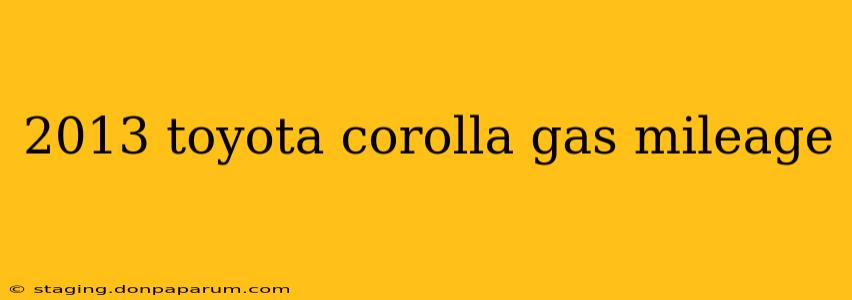The 2013 Toyota Corolla, a staple of reliability and affordability, boasts respectable fuel economy figures. However, the exact gas mileage you achieve will depend on several factors, including driving habits, vehicle condition, and the specific trim level. This guide delves into the specifics of 2013 Corolla gas mileage, helping you understand what to expect and how to maximize your fuel efficiency.
EPA Estimates vs. Real-World MPG
The Environmental Protection Agency (EPA) provides estimated fuel economy figures for all vehicles sold in the US. These estimates are based on standardized testing procedures and serve as a useful benchmark. However, real-world gas mileage often differs from EPA estimates. Factors like aggressive driving, frequent acceleration and braking, and consistently driving in city traffic can significantly lower your MPG. Conversely, maintaining a steady speed on highways and employing fuel-efficient driving techniques can improve your mileage.
For the 2013 Toyota Corolla, the EPA estimates typically fall within these ranges:
- City MPG: Around 27-28 mpg
- Highway MPG: Around 34-35 mpg
- Combined MPG: Around 30 mpg
It's crucial to remember that these are estimates. Your actual gas mileage could be higher or lower depending on the variables mentioned above.
Factors Affecting 2013 Corolla Gas Mileage
Several factors contribute to variations in fuel economy for your 2013 Toyota Corolla:
1. Driving Habits:
- Aggressive driving: Rapid acceleration, hard braking, and high speeds dramatically reduce fuel efficiency.
- Consistent speed: Maintaining a steady speed, especially on highways, is key to maximizing MPG.
- Traffic conditions: Stop-and-go city driving typically yields lower fuel economy than highway driving.
- Air conditioning: Using air conditioning consumes additional fuel.
2. Vehicle Condition:
- Tire pressure: Under-inflated tires increase rolling resistance, lowering fuel economy. Maintaining proper tire pressure is vital.
- Regular maintenance: Keeping your Corolla properly maintained, including regular oil changes and tune-ups, ensures optimal engine performance and fuel efficiency.
- Engine condition: A poorly maintained engine can significantly reduce fuel efficiency.
3. Trim Level and Engine Type:
The 2013 Corolla offered different engine options and trim levels, each with slightly varying fuel economy ratings. Consulting your owner's manual will provide the precise EPA estimates for your specific model.
Tips for Improving Your 2013 Corolla's Gas Mileage
Here are several practical tips to improve your 2013 Toyota Corolla's fuel efficiency:
- Maintain proper tire pressure: Check your tire pressure regularly and inflate them to the recommended pressure listed in your owner's manual.
- Drive smoothly: Avoid rapid acceleration and braking. Accelerate gradually and maintain a consistent speed.
- Use cruise control on highways: Cruise control helps maintain a constant speed, improving fuel efficiency.
- Reduce weight: Unnecessary weight in your vehicle reduces fuel economy. Remove any items you don't need.
- Regular maintenance: Keep up with scheduled maintenance to ensure your engine is running efficiently.
- Plan your routes: Avoid unnecessary idling and congestion by planning your routes in advance.
By understanding the factors affecting gas mileage and implementing these tips, you can optimize your 2013 Toyota Corolla's fuel efficiency and potentially save money on gas. Remember to always consult your owner's manual for the most accurate and specific information regarding your vehicle's fuel economy.

